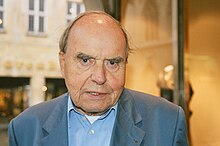Harald Deilmann
- View a machine-translated version of the German article.
- Machine translation, like DeepL or Google Translate, is a useful starting point for translations, but translators must revise errors as necessary and confirm that the translation is accurate, rather than simply copy-pasting machine-translated text into the English Wikipedia.
- Do not translate text that appears unreliable or low-quality. If possible, verify the text with references provided in the foreign-language article.
- You must provide copyright attribution in the edit summary accompanying your translation by providing an interlanguage link to the source of your translation. A model attribution edit summary is
Content in this edit is translated from the existing German Wikipedia article at [[:de:Harald Deilmann]]; see its history for attribution. - You may also add the template
{{Translated|de|Harald Deilmann}}to the talk page. - For more guidance, see Wikipedia:Translation.



Harald Deilmann (30 August 1920 – 1 January 2008) was a German architect.
Born in Gladbeck, Westphalia, Deilmann was best known for his work on public spaces, such as opera houses and museums, throughout Germany and worldwide. He was a member of the Akademie der Künste (Academy of the Arts) in Berlin, as well as the Deutsche Akademie für Städtebau und Landesplanung (German Academy for Urban and Regional Planning) in Hanover, Germany.
He was an associate of Heinrich Bartmann (1951–1953) and joined the Architektenteam Münster (Harald Deilmann, Max von Hausen, Ortwin Rave [de], Werner Ruhnau [de] in the competition for the theater Münster in 1953. He left the team before the opening of the theater Münster to start his own office in 1956. He took part in the development of his home town Münster in the time of the German Wirtschaftswunder 1950–1975. As a protagonist of postwar modernism he taught architecture at the Technical University Stuttgart and Dortmund.
Deilmann officially retired in 1985 but continued to do freelance work until his death in Münster.
Selected awards
- 1962 grand prize for North Westphalia architecture
- 1998 Cross of the White Rose, Helsinki, Finland.
Selected projects
- Theater:
- 1952–1955: Stadttheater Münster
- 1959–1988: Aalto Theatre, Essen (nach Alvar Aalto)
- Theater in Tokyo
- City Halls:
- 1957: Rathaus Nordwalde
- 1971–1974: Rathaus Rheda-Wiedenbrück
- Rathaus Gronau, North Rhine-Westphalia
- Schools and Universities
- Schülerinternat Münster
- Bielefeld University (competition)
- Martin-Luther-Schule Bielefeld
- Realschule Lemgo
- Metallberufsschule
- John F. Kennedy School, Berlin
- Museums
- Clemens-Sels-Museum Neuss
- Banks:
- WestLB Dortmund
- Town or urban planning:
- Stadtkern Werne
- Allwetterzoo Münster
- Office Buildings:
- Kreishaus Münster
- Verwaltung Nordwest Lotto Münster
- Hauptverwaltung LVA Rheinprovinz Düsseldorf
- Hauptverwaltung WestLB Münster, Düsseldorf und Dortmund
- Verwaltungsgebäude Wohnbauförderungsanstalt Düsseldorf
- Verwaltung Volkswohl-Bund in Dortmund
- Hospitals:
- Aggertalklinik Engelskirchen
- Städt. Krankenhaus Siegburg
- Fachklinikum Bad Salzuflen, Ahlbeck Reingau
- St.-Barbara-Krankenhaus Gladbeck
- Miscellaneous:
- 1979–1981: Rheinturm Düsseldorf
External links

- Architekt Deilmann obituary (in German)
- v
- t
- e










